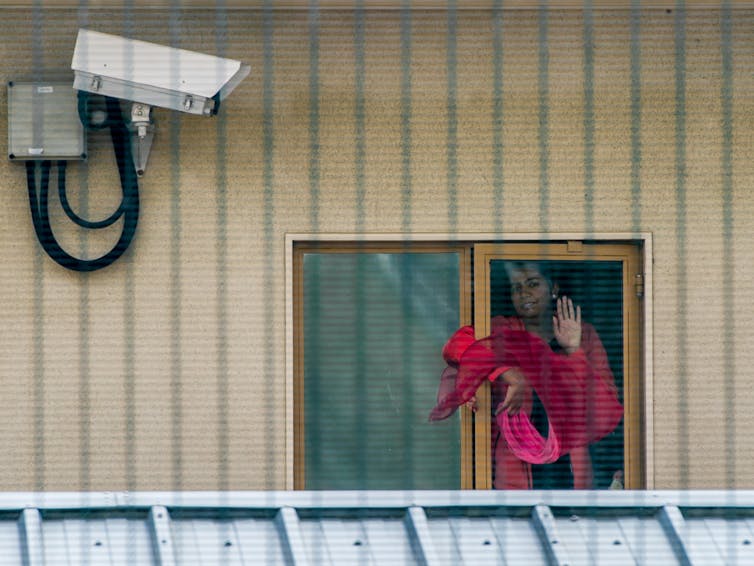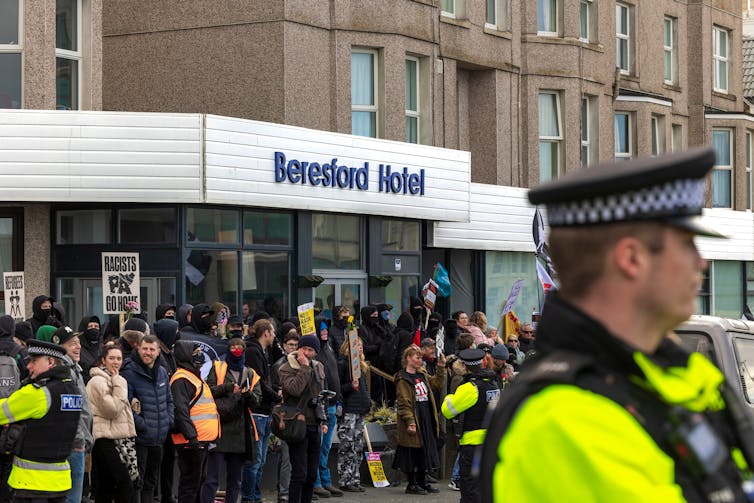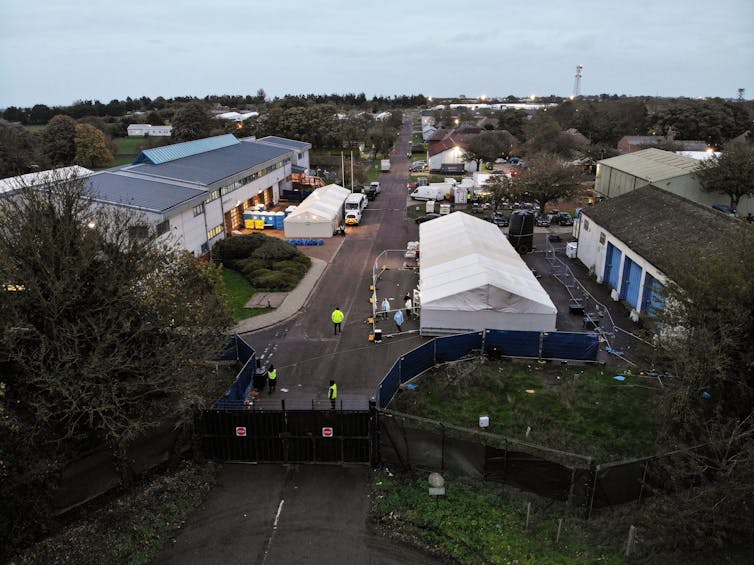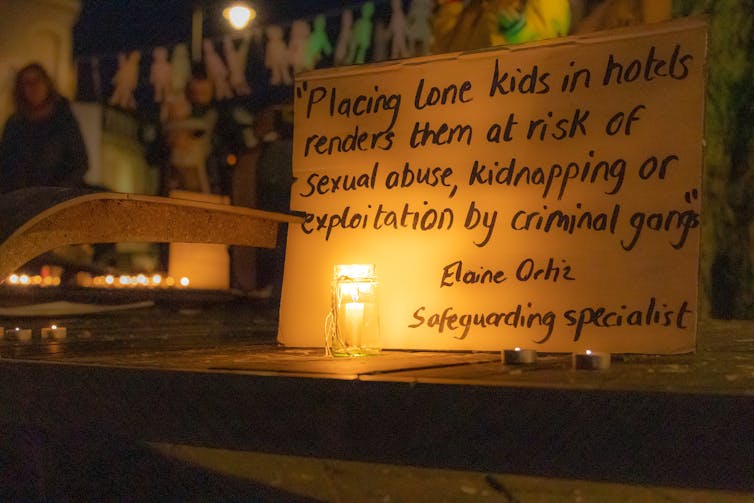Warning: this story contains graphic descriptions of violence. Pseudonyms are used to protect the interviewees’ identities.
Angela had already been in the UK as an asylum seeker for nine years and four months when we interviewed her. She was still in a state of limbo, unsure whether asylum would be granted, and her story was disturbing to hear.
Angela told us she had left Nigeria after an appalling terrorist attack. Her father was a high-ranking regional politician, a Christian in a mainly Muslim area. Following a political dispute, the family compound was attacked by members of the militant Islamist Boko Haram organisation. Angela told us that her father, her husband and others were killed – and that she was shot at, raped, beaten and left for dead:
I was raped not one, not two, not three … I can’t remember how many times. The shocking thing is the person – I remember his face – who chopped my husband’s legs is still very much alive. He comes on social media almost every day.
Angela is one of 12 asylum seekers and refugees from Africa and the Middle East we interviewed for a study published in 2020. We wanted to examine not only the experiences that drove them to the UK, but also the psychological effects of their subsequent experiences in the UK’s asylum system.
These accounts bear revisiting amid current widespread concerns about the record numbers, welfare and experiences of asylum seekers detained in the UK immigration system.
This article is part of Conversation Insights
The Insights team generates long-form journalism derived from interdisciplinary research. The team is working with academics from different backgrounds who have been engaged in projects aimed at tackling societal and scientific challenges.
Like all the women and men we spoke to, Angela now lives in West Yorkshire. A decade after the attack on her home in Nigeria, she told us she was still having regular flashbacks and experiencing severe trauma. She probably wouldn’t have survived the attack without the help of an elderly couple from a nearby village, who initially cared for her. But incredibly, this wasn’t the end of her ordeal.
The couple contacted their daughter in Lagos and arranged for Angela to travel there, where they thought it would be safer. But when she had medical treatment in the city, members of a Boko Haram cell became aware of her presence and attacked the hospital. She escaped unharmed – but when the elderly couple’s daughter collected her, the car was shot at and their daughter was killed. Angela told us:
I had to pretend I was dead as well because there was blood all over the car. I think that’s when they stopped shooting, because they thought I was dead.
As she talked, Angela pointed to a scar on her calf caused by one of the bullets. It was one of many scars all over her body that offered graphic evidence of her traumatic experiences in Nigeria. Despite this, when a friend of her father’s arranged a UK visa for her, she was only thinking in terms of a temporary stay:
I didn’t seek asylum at first because it didn’t even cross my head. I never thought I’d end up living in the UK.
Taken into detention
Once she reached the UK, Angela hoped her suffering would be over. For the next ten years, she lived in a variety of detention centres, hostels and shared houses in different towns and cities around the UK. For most of this time, she survived on food vouchers and the help of charities and refugee support organisations.
Asylum seekers currently receive a maximum allowance of £45 per week, compared with £77 for those on unemployment benefit. If asylum seekers live in accommodation that provides food (such as a hotel), this drops to to £8.24 per week to cover clothes, non-prescription medication and travel.
Angela was sometimes unable to find a solicitor, so had to represent herself at court hearings and appeals. But since her cousin in Nigeria was a barrister and her mother had a law degree, she adapted to this role quickly – describing how her encounters in court “brought out the boldness, the lioness in me”. She recalled telling one judge:
I had a beautiful life in Nigeria and it’s not something I would ever [give up] in my wildest dreams … For the Home Office representative to grate me down to rock bottom – I will not take it … I won’t come here and start fabricating lies because I want to stay in the United Kingdom.
A few months before we spoke, after almost a decade in the asylum system, Angela was served with a deportation notice and redetained. She told us:
That was worse than the first time because there was a very hopeless situation. I had no case anymore. All my appeals, everything, court hearing, everything, had been dismissed, refused.
Angela was desperate, aware of the danger she would face on her return to Nigeria. A friend advised her to contact Medical Justice, a charity that supports victims of torture in immigration detention. It found her a lawyer who made a last-minute legal intervention – and she was reprieved:
My ticket was supposed to be for the 25th of May, and it was cancelled on the 24th – ten o’clock in the night … I just ran to the room and rolled on the floor like I was going crazy. It was such a shock.
Victims of torture
We didn’t seek out traumatised individuals for our research, nor people who had been subject to torture. Yet all 12 who we interviewed described highly traumatic experiences before coming to the UK, including several accounts of torture. Given the sensitivity of their cases, our interviews were all conducted under the condition of strict anonymity.
Gloria had been living in the UK for three years – the shortest time of all our study’s participants – having arrived from the Democratic Republic of Congo (DRC), a country in the grip of civil war and conflict for decades. Gloria described how her home was attacked by an armed group who abducted both her and her brother. He was killed; she was raped and tortured.
Gloria was vague about how she had arrived in the UK, telling us: “I was brought here by someone … I had tortures and then someone helped me to flee and come to here.”
She hoped she had reached a safe haven but was put straight into detention, despite her traumatised state. Like Angela, the multiple scars on her body bore witness to the torture she had experienced. Yet she told us in her halting English:
Detention is not just detention – it is prison … It’s like you’re a criminal, but I am not a criminal. I am in trouble. I am sick but I go in the prison … In the detention, I never ate. I was just crying [and I thought:] “It’s better maybe they kill me even here.”
Gloria’s account came soon after a report by Freedom From Torture found that the Home Office would sometimes reject the evidence of scars from torture on the grounds that these might be self-inflicted wounds. This changed in 2019 when the UK Supreme Court declared that self-inflicted torture was “inherently unlikely”.
A supportive solicitor fought for Gloria’s release from detention, and she was moved to a hostel in Leeds, then one in Wakefield. Her solicitor organised an appeal for asylum, but it was rejected after a few months.
Gloria told us she was then coerced into signing a form agreeing to her deportation after being denied an interpreter – despite immigration rules stating that interpreters are available to all asylum seekers, free of charge, whenever necessary. Her claim of coercion is in line with historical allegations made of some Home Office officials. Refugee organisations also highlighted to us other cases of asylum seekers reporting that they had been tricked or forced into signing “voluntary return” forms.
Gloria told us:
I was not able to understand or to speak English well. I told them there [should] be an interpreter because I’m not going to understand. They said: “No, it’s not the big interview” … Then they give me the papers to sign. They just said: “We need to put your status, that you are Congolese, in your documents.”
When Gloria was finally allowed to read the text translated into French, she realised it related to “travelling documents to take me back and deport me. But they didn’t tell me that. They told me it was for my nationality.”
After this Gloria was taken into detention again, until her solicitor managed to free her and put her in contact with Freedom From Torture, a charity supporting torture survivors in the UK. It arranged a medical examination including photographs of her scars, which enabled her to make another appeal for asylum which, at the time we spoke, was still ongoing.
Gloria told us she had made a mistake coming to the UK, due to the hostility she encountered from the Home Office and the constant uncertainty, anxiety and stress she experienced in the asylum system. She said she had frequently contemplated suicide, even while out of detention and living in a hostel. Despite the horrors she had suffered in DRC, she told us:
I thought I come here to find refuge but … I’ve come to find worse problems for me.
After their suffering, further trauma
Having come to the UK to escape appalling suffering, all of our interviewees described experiencing further trauma while in the asylum system.
Between them, they highlighted a number of factors, including the protracted nature of the process, the perceived hostility of the Home Office, the traumatic effects of detention, a lack of control over their own lives, and the humiliation and frustration of being unable to work or contribute to UK society while seeking asylum here. (Asylum seekers cannot do paid work while their claims are being considered. They can do voluntary work as long as it does not interfere with their appointments and hearings.)

Pete Maclaine/Shutterstock
One of the most protracted cases was Joy’s, an asylum seeker from Zimbabwe who had been trapped in the UK system for 14 years when we met her. She was a political activist who came to the UK to escape persecution after fellow activists in Zimbabwe had been arrested, abducted and tortured. She explained:
I’m one of the people at the forefront of campaigning against the human rights abuse that are happening in Zimbabwe … We have activists on the ground [there] who have suffered. They’ve been tortured, they’ve been beaten, they’ve been arrested. They are being abducted for voicing [against] what the government is doing.
Joy had left two young children in the care of her parents in Zimbabwe, hoping to return when it was safe. After her initial asylum claim was rejected, the Home Office ended Joy’s financial support and ordered her to move out of her accommodation. Her solicitor appealed the decision while she survived on weekly food parcels from the Red Cross.
In all, she had made four applications for asylum when we met her, all of which were beset by very long delays. In the most recent case, she told us:
The judge at the judicial review ruled the Home Office had made an error, and that they should go back and have a look at the case again … [But] the Home Office … just sort of copied-and-pasted the same refusal letter again – although this time they said I could appeal to the tribunal.
When we spoke, Joy was still hoping to return to Zimbabwe and see her children again, but knew the situation was too dangerous. After 14 years, she accepted the uncertainty of her life:
I’ve come to a point where I … don’t want to keep on thinking of what if, what if, what if, what if? I will just take it as it comes. And then I will make a decision from there.
The Home Office says it aims to process initial claims within six months, but in practice it takes much longer. For example, in November 2022, the Home Affairs Select Committee revealed that, of all people who arrived in the UK by boat to claim asylum in 2021, only 4% had had their claims processed.

J. Mundy/Shutterstock
‘Sleeping with fear’
For all our interviewees, the protracted UK asylum process brought a constant sense of uncertainty, and the continual fear of sudden deportation.
Farah, from Iran, described awaiting a decision from the Home Office as “living fear for four years”. Fleeing persecution from the Islamic regime, she had paid for a smuggler to bring her into the UK by plane, along with her 11-year-old daughter.
In the UK, they lived in shared houses and hostels with other asylum seekers and refugees from a variety of countries. Farah said that every so often, Home Office officials would arrive to deport residents. She was constantly afraid that they would be next:
I couldn’t get out of the depression it made for me … I used to open my window to hear if [the immigration authorities] were coming … Imagine every single night, you are sleeping with fear. I was scared to open the door to people. I didn’t have confidence to go out.
But Farah was one of the lucky ones. After four years, her asylum appeal was accepted. In the seven years since then, her daughter has completed a university degree, while she has worked as a teaching assistant and in a variety of voluntary roles – most recently, as an interpreter at her local GP surgery.
Most of our participants expressed a strong desire to contribute to UK society while stuck within the asylum system. They found it intensely frustrating that they were unable to do so, since they weren’t allowed to work. Some are highly educated and professionally successful in their original countries, and were desperate to use their knowledge and expertise. As Farah put it:
You need to contribute something … I’m not a parasite person. You know, I wanted to do something.
According to Anne Burghgraef of Solace, a Leeds-based organisation that offers mental health support for refugees and asylum seekers:
People who come with great knowledge and expertise are forced into years of passivity. There are so many highly skilled people who just need to learn the language properly and adapt to the UK system.
Nevertheless, most of our participants strived to be of service to others within the limited environment of the refugee and asylum seeker community – for example, by volunteering as interpreters or organising social activities. In fact, our research highlighted this as an important coping strategy for our interviewees, to mitigate their ongoing anxiety and trauma.
A hostile environment
It is hard to imagine how any of the asylum seekers and refugees we spoke to would have coped – and in some cases, even survived – without the support of national and local organisations such as Solace.
In every case, our interviewees’ initial applications for asylum had been rejected. They quickly learned – either from fellow asylum seekers or legal advisers – that this was common practice, a ploy of deterring even the most valid claims. As another asylum seeker from Nigeria, Ebele, said of her initial rejection:
It’s part of the process – it’s like they want to stress people … They want [you] to think … that you can go back [home].
Leon had paid for a trafficker to take him to the UK from Guinea. From an affluent family, he was making a comfortable living as a businessman and owned several shops. However his father, a high-ranking soldier, had a dispute with government officials. Leon described government-sponsored thugs ransacking his shops, stealing his goods, then burning the shops to the ground.
On arrival in the UK, he was taken to a detention centre where he stayed for “three months and 11 days. And it was really bad for me, because I’d never been to jail in my life.”

Edward Crawford/Shutterstock
After a lawyer helped Leon apply for asylum, he moved to temporary accommodation in Huddersfield and then Leeds. His initial application was processed within six months, and refused. He was instructed to leave his accommodation immediately, but had no money and no other options:
In the winter, the Home Office told me to leave the house. I didn’t have anywhere to go. It was snowing everywhere. I had to go to stay in the park.
Shortly afterwards, Leon was beaten up and had his bag stolen:
[I lost] all my clothes. I didn’t have anything. The same clothes I was wearing. I didn’t have anywhere … I was crying.
Leon sought help from Pafras, a Leeds-based asylum seekers charity which assigned him a case worker, gave him clothes, and found him temporary accommodation. He told us the Home Office officials that he dealt with had no concept of what life was like in Guinea or any other troubled African country, and couldn’t comprehend the terror he had experienced or would encounter if he returned:
They think we are fine – that everything’s fine in my country. Anything you tell them, they always say it’s a lie … And you can’t force them to believe you.
Having been a successful businessman in Guinea, Leon – like many of our interviewees – told us he found it humiliating to live on food vouchers, food parcels, clothes donations, and other forms of charity.
The only thing I hate all my life is begging – to beg for something. I work. I always worked … So [if] I stay with you and you’re helping me for some time, I’m having difficulty – because it’s like I’m begging you, or I’m telling you my problem [so you will] help me.
‘Digging my grave’
Imani is one of our three interviewees who were eventually granted refugee status – in her case, after six years as an asylum seeker. She had come to the UK from Guinea aged only 13.
After the death of her mother, she said she was treated as a slave by her stepmother and suffered genital mutilation. Her family arranged for her to marry an elderly man, but an old friend of her mother’s helped her to escape and paid for her to be trafficked to the UK.

J. Mundy/Shutterstock
During the six years of her asylum process and despite her young age, Imani said she was faced with constant disbelief and hostility by officials who regularly threatened her with deportation. The Home Office questioned her stated age, and didn’t believe “that my parents can give me to marriage at the age of 13 years to someone who has another wife”.
In her words, the Home Office were “digging my grave without even killing me. It was so difficult.”
The Home Office notes that cases involving age disputes can be extremely challenging, and that the safety and welfare of children in its care is paramount. In Imani’s case, there was a positive resolution.
Having finally attained refugee status, she was able to secure a paid job as a mental health support worker. She also campaigns against female genital mutilation, organising conferences and speaking in the media. She told us:
I share my story, to let them know I’m a survivor.
On suicide watch
Previous studies have shown that asylum seekers and refugees generally are around ten times more likely to experience psychiatric disorders than the general population. They have been found to experience high levels of post-traumatic stress disorder, depression, and suicidal ideation.
This was true of all of our participants. Several reported seriously contemplating suicide. Some, including George, an African asylum seeker who had spent 11 years in the UK system when we met him, had attempted to take their life. He told us:
I’ve thought of committing suicide. I was on suicide watch for some time. Twice now, I’ve tried to take my own life.
George, who is bisexual, described in graphic detail how, as a teenager, he had been designated a “witch” and subjected to severe physical and sexual abuse during rituals. He showed us multiple scars and injuries all over his body, including marks where his fingertips had been cut to draw blood.
After 11 years in the UK, George told us that his case was “still ongoing, and ongoing and ongoing”:
It’s hard to be living this life of uncertainty. You don’t know what is going to happen. You could just be in the house tonight and they’ll come with their squad, break down your door and get you out. Just like that. You just take the life hour by hour.
Like Gloria, George told us he was experiencing constant flashbacks to his earlier violent trauma:
When I try to sleep, I see faces. Sometimes I hear the voice of my mother – she’s crying sometimes … And I hear the man that abused me – you know, what he was saying to me. And there was this sperm that he rubbed, you know, he put on my face when he was abusing me. That smell never leaves my nostrils.
More detention and trauma
Under the government’s controversial illegal migration bill, introduced on March 7 2023, none of the individuals we’ve heard from would have been admitted to the UK. The bill effectively denies asylum to anybody who is not part of an agreed scheme, no matter how compelling or urgent their case.
If the bill is passed by parliament, anyone who seeks asylum in the UK without being a part of an agreed scheme will either be returned to their home country or shipped to a third-party country, such as Rwanda, without recourse to any form of legal appeal.
Read more:
‘A toxic policy with little returns’ – lessons for the UK-Rwanda deal from Australia and the US
In reality, however, it is doubtful that more than a tiny number of asylum seekers will be shipped anywhere. If enacted, the government’s bill is predicted to lead to more long-term detention. As Peter William Walsh from the Migration Observatory has pointed out:
One strange quirk of the new bill is that it appears to make it harder, not easier, for the government to remove people who are not considered refugees.
Asylum seekers can only be sent back to their home countries if they are deemed safe – but since the new bill doesn’t allow claims to be assessed, there is no way of determining this. This suggests that they would have to be sent to a third-party country.
So far, though, only Rwanda has agreed to serve this role, and is presently only capable of taking 200 people. No one has actually been sent there yet, and it is possible that, due to legal challenges, no one will be. The implication is that most new asylum seekers will be detained indefinitely in the UK, no matter how valid their claims.
According to the most recent statistics, the Home Office has a backlog of 166,100 asylum cases, including 101,400 cases awaiting an initial decision, 4,900 awaiting the outcome of an appeal, and around 38,900 cases subject to removal action.
The Home Office acknowledges the asylum system has been under mounting pressure for several years. It states that it is recruiting more decision-makers to help clear the backlog of cases, with a target of employing 2,500 by September 2023.
However, research by the Refugee Council suggests the government’s new illegal migration bill could mean that, over the next three years, 190,000 more people are “locked up or forced into destitution”. This figure – which the Home Office has disputed – includes 45,000 children and even factors in the possibility that 30,000 asylum seekers could be sent to Rwanda. The cost to the British taxpayer is estimated at around £9 billion by the Refugee Council study.
In practice, the government’s new bill may achieve little beyond, in the words of Solace’s Burghgraef: “Exerting unbearable pressure on thousands of already traumatised and extremely stressed sanctuary seekers, putting them at risk of long term entrenched mental health difficulties.”
When some of the issues raised by this article were put to the Home Office, a spokesperson commmented:
We have not been able to investigate the individual [anonymised] accusations as we have not received their details. But we recognise many asylum seekers have experienced challenging circumstances when making their way here, which is why we ensure our staff are robustly trained to identify vulnerabilities throughout the process.
The spokesperson added:
The UK has a proud record of providing protection to individuals fleeing persecution, underpinned by a robust framework of safeguards and quality checks to ensure protection is granted to those who genuinely need it.
‘Tired of everything’
In The House of the Dead, the Russian novelist Dostoevsky wrote that “the degree of civilisation in a society can be judged by entering its prisons”. In a similar way, we can judge how civilised a society is by the way it treats asylum seekers and refugees. By this criterion, we are clearly failing.
Our interviews offer a reminder that every asylum seeker or refugee is not a political statistic but an individual with a complex personal history. At a time when some MPs and commentators are attempting to delegitimise the whole concept of seeking asylum – claiming that “most” asylum seekers are either criminals or economic migrants – the stories illustrate that a great many are, in fact, deeply traumatised individuals with extremely poor mental health.
Mariama, from Sierra Leone, was one of the lucky ones whose claim for asylum had been approved when we interviewed her. She had previously struggled to survive in the UK for nine years, spending most of the time “squatting” on the floors and sofas of acquaintances or strangers – who, she told us, often exploited her by requiring her to work for them:
You have to work in houses, cook for them, do everything for them – and during those times you don’t even have your freedom. You’re not free because you are in somebody [else]’s house.
Now that she had refugee status, however, Mariama said she felt relieved and grateful to still be alive – like a survivor at the end of a long war. But she was also quick to point out that many others in the UK’s asylum system are not so fortunate:
I’ve heard of asylum seekers who committed suicide – left a note [saying] they shouldn’t blame anybody. [They’re] just tired of everything … So I feel grateful I’m still alive. And I feel grateful that there are still good people out there, who can come to your aid when you need them.

For you: more from our Insights series:
-
‘A toxic policy with little returns’ – lessons for the UK-Rwanda deal from Australia and the US
-
COVID heroes left behind: the ‘invisible’ women struggling to make ends meet
-
‘It’s like being in a warzone’ – A&E nurses open up about the emotional cost of working on the NHS frontline
To hear about new Insights articles, join the hundreds of thousands of people who value The Conversation’s evidence-based news. Subscribe to our newsletter.
![]()
Steve Taylor does not work for, consult, own shares in or receive funding from any company or organisation that would benefit from this article, and has disclosed no relevant affiliations beyond their academic appointment. He is the author of DisConnected: The Roots of Human Cruelty and How Connection Can Heal the World (Iff Books).











